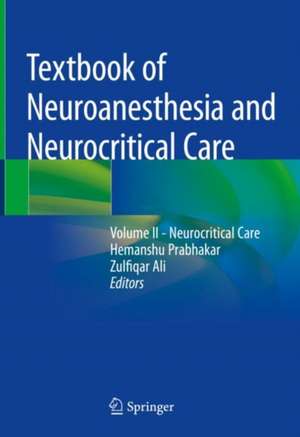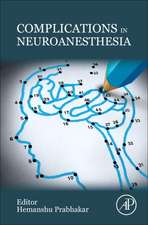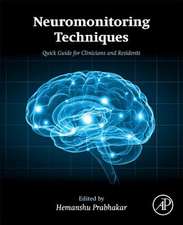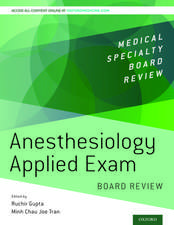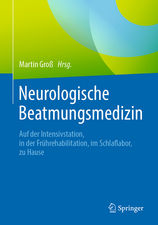Textbook of Neuroanesthesia and Neurocritical Care: Volume II - Neurocritical Care
Editat de Hemanshu Prabhakar, Zulfiqar Alien Limba Engleză Hardback – 14 mai 2019
The book begins with basic information on the principles of neurocritical care. Management of various neurological problems such as myasthenia gravis, Guillain-Barré syndrome, epilepsy, stroke and many more are discussed in detail. Subsequent sections address nursing care, physiotherapy and psychological care, issues related to brain death and organ donation, and common complications observed in neurological patients during their ICS stays. Each complication is discussed in detail, guiding readers in their clinical practice. In turn, the book’s closing chapters cover e.g. the role of hypothermia and evidence-based practice.
The book offers a valuable resource for all residents, fellows and trainees in the fields of neurointensive care and critical care; it will also benefit intensivists and neurocritical care experts.
| Toate formatele și edițiile | Preț | Express |
|---|---|---|
| Hardback (2) | 1126.27 lei 3-5 săpt. | +66.04 lei 10-14 zile |
| Springer Nature Singapore – 14 mai 2019 | 1126.27 lei 3-5 săpt. | +66.04 lei 10-14 zile |
| Springer Nature Singapore – 3 mai 2019 | 1168.31 lei 38-44 zile |
Preț: 1126.27 lei
Preț vechi: 1185.54 lei
-5% Nou
Puncte Express: 1689
Preț estimativ în valută:
215.53€ • 223.66$ • 180.15£
215.53€ • 223.66$ • 180.15£
Carte disponibilă
Livrare economică 22 februarie-08 martie
Livrare express 11-15 februarie pentru 76.03 lei
Preluare comenzi: 021 569.72.76
Specificații
ISBN-13: 9789811333897
ISBN-10: 9811333890
Pagini: 577
Ilustrații: XIX, 461 p. 254 illus., 209 illus. in color.
Dimensiuni: 178 x 254 x 26 mm
Greutate: 1.46 kg
Ediția:1st ed. 2019
Editura: Springer Nature Singapore
Colecția Springer
Locul publicării:Singapore, Singapore
ISBN-10: 9811333890
Pagini: 577
Ilustrații: XIX, 461 p. 254 illus., 209 illus. in color.
Dimensiuni: 178 x 254 x 26 mm
Greutate: 1.46 kg
Ediția:1st ed. 2019
Editura: Springer Nature Singapore
Colecția Springer
Locul publicării:Singapore, Singapore
Cuprins
Section I - Fundamentals of neurocritical care.- Section II - Pharmacological considerations.- Section III - Critical care management.- Section IV - Neuromonitoring.- Section V - Systemic care.- Section VI - Supportive care.- Section VII - Pain management.- Section VIII - Ethical considerations.- Section IX - Near misses in critical care.- Section X - Recent advances.
Recenzii
“The book is well written. It will serve not only as an invaluable resource for intensivists and NCC physicians but also for residents, fellows, and trainees. Anesthesiologists who are not specifically trained in neuroanesthesia or neurointensive care will also find this book helpful and worth purchasing.” (Meilin Lu and Liang He, Anesthesia & Analgesia, Vol. 129 (6), December, 2019)
Notă biografică
Dr. Hemanshu Prabhakar is a Professor at the Department of Neuroanaesthesiology and Critical Care, All India Institute of Medical Sciences (AIIMS), New Delhi, India. He received his training in neuroanesthesia and completed his PhD at the same institute. He is a recipient of the AIIMS Excellence award for notable contributions in academics and has more than 200 publications in peer-reviewed national and international journals to his credit.
Dr. Prabhakar serves as a reviewer for various national and international journals. He is also a review author for the Cochrane Collaboration and has a special interest in evidence-based practice in neuroanesthesia. Dr. Prabhakar is a member of several national and international neuroanesthesia societies and is past secretary of the Indian Society of Neuroanesthesia and Critical Care. He serves on the editorial board of the Indian Journal of Palliative Care and is the executive editor of the Journal of Neuroanaesthesiology and Critical Care.
Dr. Zulfiqar Ali is an Associate Professor at the Division of Neuroanesthesiology and Neurocritical Care, Sher-I-Kashmir Institute of Medical Sciences, Srinagar, India. He received his training in neuroanesthesia at the All India Institute of Medical Sciences, New Delhi and the National Institute of Mental Health and Neurosciences, Bengaluru. His areas of interest include neurocritical care and chronic pain management. He has many publications in peer-reviewed national and international journals to his credit.
Dr. Ali is a member of various national and international neuroanesthesia societies and is a past executive committee member of the Indian Society of Neuroanesthesia and Critical Care. He serves as an associate editor of the Indian Journal of Anesthesia and co-editor of Northern Journal of ISA. In addition, he is a reviewer for several national and international journals.
Dr. Prabhakar serves as a reviewer for various national and international journals. He is also a review author for the Cochrane Collaboration and has a special interest in evidence-based practice in neuroanesthesia. Dr. Prabhakar is a member of several national and international neuroanesthesia societies and is past secretary of the Indian Society of Neuroanesthesia and Critical Care. He serves on the editorial board of the Indian Journal of Palliative Care and is the executive editor of the Journal of Neuroanaesthesiology and Critical Care.
Dr. Zulfiqar Ali is an Associate Professor at the Division of Neuroanesthesiology and Neurocritical Care, Sher-I-Kashmir Institute of Medical Sciences, Srinagar, India. He received his training in neuroanesthesia at the All India Institute of Medical Sciences, New Delhi and the National Institute of Mental Health and Neurosciences, Bengaluru. His areas of interest include neurocritical care and chronic pain management. He has many publications in peer-reviewed national and international journals to his credit.
Dr. Ali is a member of various national and international neuroanesthesia societies and is a past executive committee member of the Indian Society of Neuroanesthesia and Critical Care. He serves as an associate editor of the Indian Journal of Anesthesia and co-editor of Northern Journal of ISA. In addition, he is a reviewer for several national and international journals.
Textul de pe ultima copertă
This two-volume book offers a comprehensive guide to anesthetic management and critical care management in neurosurgical and neurological patients. This second volume focuses on neurocritical care.
The book begins with basic information on the principles of neurocritical care. Management of various neurological problems such as myasthenia gravis, Guillain-Barré syndrome, epilepsy, stroke and many more are discussed in detail. Subsequent sections address nursing care, physiotherapy and psychological care, issues related to brain death and organ donation, and common complications observed in neurological patients during their ICS stays. Each complication is discussed in detail, guiding readers in their clinical practice. In turn, the book’s closing chapters cover e.g. the role of hypothermia and evidence-based practice.
The book offers a valuable resource for all residents, fellows and trainees in the fields of neurointensive care and critical care; it will also benefit intensivists and neurocritical care experts.
The book begins with basic information on the principles of neurocritical care. Management of various neurological problems such as myasthenia gravis, Guillain-Barré syndrome, epilepsy, stroke and many more are discussed in detail. Subsequent sections address nursing care, physiotherapy and psychological care, issues related to brain death and organ donation, and common complications observed in neurological patients during their ICS stays. Each complication is discussed in detail, guiding readers in their clinical practice. In turn, the book’s closing chapters cover e.g. the role of hypothermia and evidence-based practice.
The book offers a valuable resource for all residents, fellows and trainees in the fields of neurointensive care and critical care; it will also benefit intensivists and neurocritical care experts.
Caracteristici
A comprehensive book covering all aspects of critical care management in neurological patients
Highlights the latest evidence-based approaches
Algorithms and flowcharts have been provided for quick decision-making support
Figures and schematic diagrams have been provided wherever relevant
Highlights the latest evidence-based approaches
Algorithms and flowcharts have been provided for quick decision-making support
Figures and schematic diagrams have been provided wherever relevant
